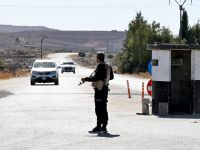Arab foreign ministers on Saturday debated ways to force Israel to lift its three-month siege of Palestinian leader Yasser Arafat, and gave renewed support for the Palestinian uprising after "Black Friday".
"Intensive Arab efforts are being made" on Arafat’s behalf, Jordan’s Foreign Minister Marwan Moasher said after meetings with his Arab counterparts, adding Arafat’s freedom of movement and participation in the summit were "important".
According to AFP, Arab and international leaders in recent days have voiced hope that Arafat, blockaded by Israeli forces in the West Bank city of Ramallah, could attend the summit in the Lebanese capital on March 27-28.
However, Arab diplomats who asked not to be named also warned that Arafat’s travelling to Beirut carried the risk that Israel would prevent him from returning to Ramallah and would force him into exile again.
In preparation for the summit, the ministers and their representatives are meeting in Cairo to decide a response to increased violence in the Palestinian territories and take a stand on a peace initiative proposed by Saudi Arabia. The meeting is due to conclude on Sunday.
Originally, the initiative proposed by Saudi Crown Prince Abdullah bin Abdulaziz on February 17 called for normalization of Arab ties with Israel in return for the Jewish state’s total withdrawal from Arab lands occupied in the 1967 war. However, the London-based television station MBC said Sunday morning that Crown Prince Abdullah has changed the wording of his peace initiative, and removed the word "normalization."
Faced with what Saudi Foreign Minister Saud Al Faisal called "Black Friday," the Arab ministers appealed for total support for the uprising. The Arab League’s Secretary-General Amr Mussa said the foreign ministers would "take the necessary decisions to support the Palestinian people, its legitimate resistance and its heroic Intifada against Israeli aggression."
The ministers issued an appeal on Friday to the United States, the United Nations, the International Committee of the Red Cross and the world community to stop the "Israeli aggression."
The Arab League ministers have drafted a resolution urging Arab states to continue lobbying the United Nations and "concerned parties" to stop "Israeli aggression" and offer protection for the Palestinians, league sources said.
Saudi Foreign Minister
Saudi Arabia's foreign minister offered Israel "complete peace from Arab nations" in exchange for Israeli withdrawal from Arab lands and the creation of an independent Palestine with Jerusalem as its capital.
Saudi Foreign Minister Saud al-Faisal, speaking to reporters after meeting Sunday with Egyptian President Hosni Mubarak, offered the most detailed Saudi remarks on the Kingdom's proposal to Israel since it was first made public last month by Saudi Crown Prince Abdullah.
"Arab nations stress their intention to realize a lasting and comprehensive peace but at the same time Israel must show its good faith toward peace," al-Faisal said Sunday.
He called on Israel to withdraw from Arab territory captured in war and grant "the legitimate rights of the Palestinians, including the creation of an independent state with Jerusalem as its capital. If it does that it will be met with complete peace from Arab nations."
Al-Faisal said Abdullah and Mubarak have spoken on the initiative and both sides shared alarm at "Palestinian bloodshed."
Al-Faisal did not elaborate on the peace proposal or say whether a written draft of the ideas had already been prepared or whether it referred to the issue of Palestinian refugees.
Last week, Palestinian Planning Minister Nabil Sha'ath said an emerging draft referred to United Nations resolution 194, which says Palestinian refugees should be allowed to return to their homes or receive compensation for their losses.
Reading from the draft, Sha'ath said it calls for a "total Israeli withdrawal from all the Arab lands occupied in 1967 and withdrawal to the borders of the 4th of June 1967, including Arab Jerusalem."
A peace agreement would "solve the outstanding problems according to UN resolutions, including the issue of refugees, based on UN resolution 194, in return for full Arab peace with Israel," Sha'ath said, quoting from the draft.
Al-Faisal did not reply directly when asked whether the Saudi peace proposal would be submitted if the Israelis kept Palestinian leader Yasser Arafat from attending the Beirut summit, but firmly indicated it would, saying the plan "is for the benefit of Palestine."
Palestinian officials have said the Saudis told them that the peace initiative would be presented at the Arab summit only if Arafat was there. Arafat has been cooped to the West Bank city of Ramallah since early December, and Israel has said it would lift the travel ban only if Arafat tries to curb attacks by Palestinian militants on Israeli civilians.
The Saudi initiative has won the support of several Arab countries, including Egypt, Jordan and Syria. However, at an Arab League foreign minister's meeting Saturday in Cairo, Libya criticized the proposals, calling on Arabs to increase support for the Palestinian uprising or Intifada.
Meanwhile, Danny Ayalon, an adviser to Israeli Prime Minister Ariel Sharon, said he could not comment until a peace initiative had been presented to the Israeli government.
"We will be happy to talk any Saudi representative or any other Arab representative," Ayalon said.
Washington has called the ideas positive. U.S. Vice President Dick Cheney is to discuss them when he visits the Mid-East region this week.
"Israel has one of two choices. Either it continues its failed policy which had not achieved either peace or security... its other choice is to accept the option of peace represented by Arab efforts at the forefront of which is the effort of the Saudi Crown Prince Abdullah," Egyptian Foreign Minister Ahmed Maher told reporters Sunday after the al-Faisal-Mubarak meeting, which he attended. (Albawaba.com)
© 2002 Al Bawaba (www.albawaba.com)







